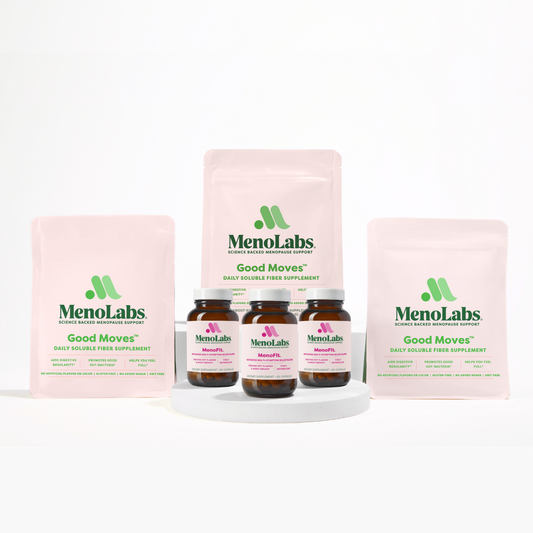While most of us find stress to generally be unavoidable, many women find the time around menopause particularly stressful. This is because hormonal changes during both perimenopause and menopause can affect mood, while symptoms such as hot flashes can cause disrupted sleep. Left unmanaged, chronic stress not only has a negative effect on our overall health, as well as our relationships, work performance and quality of life, but can also lead to severe anxiety and depression. That's why managing stress is an essential component of a healthy lifestyle and your menopause journey.
In order to dig deeper into this issue, we turned to naturopathic doctor and menopause specialist Maggie Ney, ND. Read on to find out more about what stress and anxiety look like, what some of the underlying causes might be, knowing where to go for help and finding the tools to help manage it in midlife and beyond, with Dr. Maggie.
Can stress in menopause lead to depression?
Dr. Maggie Ney: Depression during perimenopause and menopause is widespread and it is a severe issue that needs to be addressed holistically. You must consider both hormonal and lifestyle pieces to support a woman through this phase. Depression rates among middle-aged women have really soared in recent years, so it is essential that a healthcare provider helps a woman decide whether she is feeling stressed or blue, or whether she is clinically depressed. Major depression is a condition associated with a chemical imbalance in the brain. And changing hormones during perimenopause may be associated with that imbalance.
If you are feeling, alone, unsupported and confused, the most important step is to find a health care practitioner that hears you and can offer treatment. To help you find a menopause clinician who is right for you, go to the North American Menopause Society’s menopause practitioner directory.
If you are in you’re in emotional distress or suicidal crisis, call 988. The Lifeline provides 24/7, free and confidential support for people in distress, prevention and crisis resources for you or your loved ones, and best practices for professionals in the United States.
What causes midlife stress & how can we recognize it?
Dr. Maggie: Hormones are involved in our every reaction. There are receptors for the hormones in our brain that are responsible for feeling good and emotionally regulated, so when our estrogen fluctuates erratically, which happens during perimenopause, we are more prone to depression, anxiety, and brain fog.
During perimenopause and into menopause, our progesterone levels also start to decline, leading to more stress and insomnia for some people.
Our bodies send messages that we need to pay attention. Personally, when I get an eye twitch, I know I’m experiencing some stress. If my eyes are twitching, I'm like, hold on, what's going on in my life right now? The gut and brain are also connected, so gastrointestinal issues can often be related to stress.
Some people are really prone to skin eruptions when they are stressed, or experience hair loss. When our bodies are under stress, our hair follicles can go into a resting phase, and then six months later, we start to notice hair loss. I see many people who come into my practice and say “I'm not stressed, but my hair is thinning.” I say, “Well, what happened six months ago?” Ultimately, it's about being mindful of your body and what it is trying to tell you.
Is there a link between PMDD or postpartum mood swings and perimenopausal stress and mood swings?
Dr. Maggie: Our brains are sensitive to hormonal changes and fluctuations, so we know that during hormonal changes, we're more prone to depression. During puberty, during and before our period, and postpartum (after you have a baby), there's a significant drop in estrogen and progesterone, which makes us more prone to mood disorders. During perimenopause and menopause, varying estrogen levels — either a drop in estrogen or erratic production of estrogen– and a decrease in progesterone, can also lead to more anxiety and depression.
What's the difference between stress and anxiety?
Dr. Maggie: There's a lot of overlap between anxiety and stress, and I think we often use the words interchangeably. Stress tends to be related to a known trigger, like a work presentation or childcare. You can point to it and when the stressor resolves itself, the stress is relieved.
Anxiety, meanwhile, doesn't always have a trigger. You can't always point to what is causing it, it's just sort of this underlying feeling of unease. It can often happen when we pass our stress threshold and it all becomes just too much, and then we get into an anxiety response. Anxiety can also lingers longer and doesn't always go away when a stressful situation is resolved.
Can bloating be a sign of stress?
There are a lot of potential causes of bloating, but the first thing I look at in anyone who struggles with bloating is their nervous system and their stress response. When we're bloating, food is either fermenting in or not moving as quickly through the gut, so it can lead to bloating. Optimal digestion is related to motility — the normal, natural movement of muscles and digestive organs that keeps food moving through the digestive tract —and when we are stressed the motility of our digestive system is often decreased. The parasympathetic nervous system controls processes in the body such as digestion, so to achieve optimum digestion we need to be in a parasympathetic state, also known as “rest and digest”. To do this it’s important to be mindful when you’re eating, to eat slowly, and chew your food really, really, really well, and not to multitask or eat on the run.
Does stress affect your sleep, or does sleeplessness lead to stress?
It's both. It's definitely a cycle. Stress can interfere with sleep and if you're not sleeping well, you're certainly not managing stress well so it's important to prioritize it. Sleep is the ultimate act of self-care. Everyone's a little different, but most people need seven to nine hours a night.
What supplements can help with mood?
Dr. Maggie: L-Tyrosine is an amino acid produced naturally by our bodies and it is an essential component for the production of several important brain chemicals called neurotransmitters, including epinephrine, norepinephrine, and dopamine that affect mood. Dopamine, in particular, is essential as it allows us to feel pleasure, satisfaction and motivation. When you feel good about achieving something, it's because you have experienced a surge of dopamine in the brain and Tyrosine can really help boost stores of that.
Tyrosine can also help boost norepinephrine and epinephrine, two hormones that work together in stressful situations to increase blood flow throughout your body. Low levels of dopamine can leave you feeling tired and unmotivated, or sad, while low levels of norepinephrine and epinephrine can contribute to depression, anxiety, and other health issues.
Gamma-aminobutyric acid (GABA) is another naturally-occurring amino acid that acts as an inhibitory neurotransmitter, meaning it slows down information in your nervous system to keep it from getting overwhelmed. Low GABA levels are associated with most mental health conditions. GABA is one of my favorite amino acids because it’s very calming. GABA also helps regulate both REM and non-REM sleep, and plays a role in modulating your circadian rhythm by keeping your overall sleep-wake cycle in balance.
Can diet help to manage stress?
Dr. Maggie: Diet is one of the first things I look at when talking to my patients about stress management, because it often comes down to blood sugar. When our blood sugar crashes, it elicits a stress response in the body. When you eat foods that quickly break down into sugar, like candy or pasta, bread, pastries, croissants, even tortilla chips, they cause a spike in blood sugar and our body releases insulin, a hormone that prompts cells to absorb blood sugar for energy or storage.
As the cells absorb blood sugar, levels in the bloodstream begin to fall which can elicit a stress response as our body releases cortisol to boost blood sugar levels, mimicking the same physiological reactions as stress.
By switching your diet up to include healthy protein sources, fats, vegetables, and fiber you can help to keep your blood sugar stable.
Can staying active help manage stress?
Dr. Maggie: Movement is so important. So we know that exercise releases endorphins, which are our feel-good hormones. We tend to feel better when we move and exercise also gets us out of our heads a little so that we can think about things more clearly, and better solve and cope with problems that seem unmanageable.
How can mindfulness help support mood and sleep during menopause?
Mindfulness is so important, and what I mean by mindfulness is the practice of regularly checking in with your body and seeing how you're feeling and what your body needs without any judgment. This practice can help us to be a little bit calmer, less reactive, and will set our nervous system up for getting to be able to fall asleep.
What are some other easy ways to manage stress throughout the day?
Just take a moment just to focus on your breathing — even if it’s just saying to yourself, “I'm breathing in. I'm breathing out.” A big sigh is also really great. It's called a physiological sigh and it just lets things out. Go for a quick walk outside or do some grounding exercises like standing barefoot in the sand, dirt, or grass for just a few minutes. That connection to nature is called grounding, and it can be really calming for most people. Journaling or reading can also be very relaxing and provide a moment to be alone.
If you are stuck at your desk, take a moment to sit cross legged — it’s a nice hip opener that can release stored stress and emotion. I also love the eagle pose to relax the shoulders. The other thing to pay attention to is your jaw. We are often clenching our jaw and by doing some open mouth stretching and relaxing the jaw you can quickly lower the stress response in your body.
You can listen to the full conversation here and don’t forget to sign up here for future MenoLabs LIVE! discussions.
Related Products
Blend Besties Bundle
Fresh Start Bundle
4.7 / 5.0
(554) 554 total reviews












